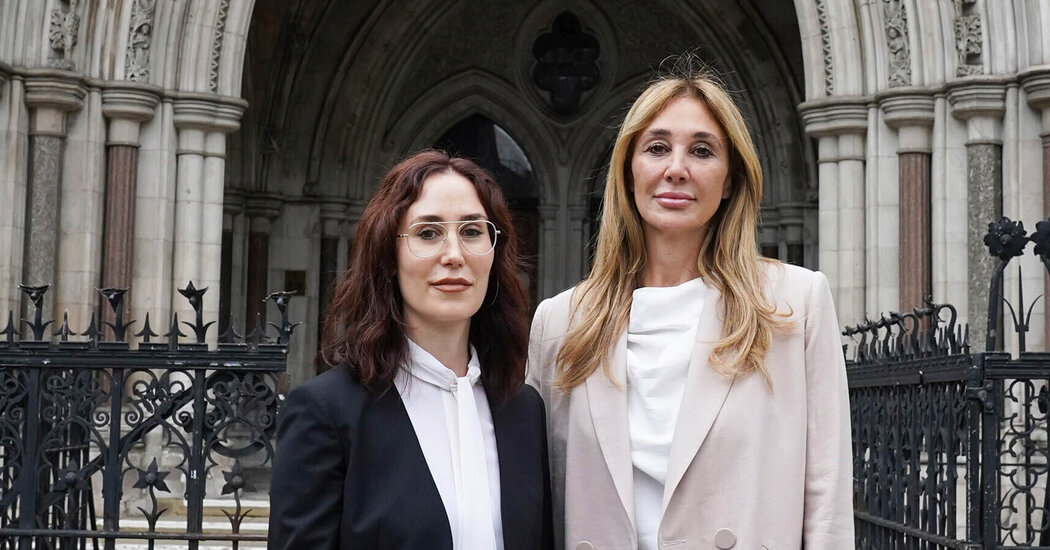Two women accused in Brooklyn of mistreating employees of their “orgasmic meditation” group argued that key evidence against them had been concocted for a true-crime documentary and had it thrown out of court.
The women, Nicole Daedone and Rachel Cherwitz, won a major pretrial decision in March when prosecutors said in court papers that they no longer considered a key witness credible for their criminal case.
That witness, Ayries Blanck, had been expected to testify this year in Brooklyn federal court and offer her journals about her experience at the company in question, OneTaste.
“The government no longer believes that the disputed portions of the handwritten journals are authentic,” prosecutors wrote to the judge overseeing the case. The diaries, they said, were actually transcribed by hand years later, and they will no longer call Ms. Blanck as a witness nor “seek to admit any of Blanck’s journals at trial.”
Their decision means a woman who had been central to prosecutors’ case will not be heard at all.
OneTaste in its heyday was a titillating blend of San Francisco’s counterculture and its tech boom — a wellness startup that made headlines by advocating female empowerment through orgasm. It offered classes and sessions that sometimes cost five figures.
But disaffected ex-employees said the company’s facade of liberation hid something cultish. Ms. Blanck’s account of her time at OneTaste and her journals were memorialized in a 2022 Netflix documentary, “Orgasm Inc.,” which painted a dark picture of a sexually coercive workplace where workers were manipulated and mistreated by Ms. Daedone and Ms. Cherwitz.
Five months after the documentary was released, Ms. Daedone and Ms. Cherwitz were each indicted on a single count of forced labor conspiracy.
The Justice Department said in court papers that the women, under the guise of wellness, sought to control their employees’ lives by withholding wages, driving them into debt and instructing them to perform sex acts. Ms. Daedone and Ms. Cherwitz are set to go on trial in May. The case was investigated out of Brooklyn partly because the company had a business affiliate there.
The situation has been complicated by sprawling civil litigation that overlaps with much of the criminal case. A federal appeals court in Manhattan recently decided that it would hear arguments about whether prosecutors improperly used evidence from a lawsuit. That hearing is set for Monday.
The civil litigation also played a role in the Blanck saga. The defense has argued that at least one person who helped make the 2022 documentary also edited a digital version of the journals that described events from years before, suggesting Ms. Blanck’s story was tainted from the start by television storytelling. In the journals, Ms. Blanck describes being coerced into sex, beaten by a boyfriend and manipulated by her bosses.
Court documents also showed that Netflix paid $25,000 to Ms. Blanck’s sister, who was featured in the documentary reading from the journals, her voice standing in for her sibling’s.
Defense lawyers spent months arguing that there were many reasons that the journals could not have been written in 2015 as Ms. Blanck claimed. The journals cite a book that came out in 2019. The written entries match word-for-word an electronic version of the journals that had been edited over time and by people other than Ms. Blanck. Other known details of Ms. Blanck’s life did not square with the content of the journals.
To the defendants, a case based even in part on Ms. Blanck’s testimony and writing was inherently fraudulent. “The government would have presented perjured testimony from its star witness at trial, potentially leading to a wrongful conviction of the defendants,” Ms. Cherwitz’s lawyer Celia Cohen wrote to the judge.
After interviews with the F.B.I., Ms. Blanck admitted that her account of creating the handwritten journals was not true, according to the prosecutors’ filing. Many parts of the filing are redacted, making it unclear exactly what was false.
The filing said Ms. Blanck had admitted “that she physically copied the relevant portion of the handwritten journals after typing” her account elsewhere. “Blanck maintains that she wrote the typewritten journals based at least in part on contemporaneously-written journal entries,” prosecutors wrote.
A lawyer who has represented Ms. Blanck did not respond to messages seeking comment.
For months, prosecutors had told the judge that the journals indicated “a high degree of trustworthiness” and represented the best evidence of Ms. Blanck’s psychological and emotional state at the time.
The prosecutors now say that Ms. Blanck’s journals are unnecessary and irrelevant. Without her as a witness, they plan to call several other former OneTaste members and employees to testify.
To the defendants, the hard-fought victory points to a flaw at the heart of the case.
“People watch a movie on Netflix and think it’s true, but it’s not,” Ms. Cherwitz said. “If you can slap the word ‘cult’ or ‘sex cult’ on it, it seems nefarious and dangerous, which is just woefully untrue.”
A Netflix spokesman declined to comment.
Ms. Daedone, the company founder who once declared “my religion really is orgasm,” said in an interview that her advocacy of female stimulation as a form of meditation and therapy had angered people, but that nothing about the company was criminal.
She called the accusations “a narrative shaped by the media and adopted by the government.” She added: “I have to see it all the way through until the truth is revealed.”
